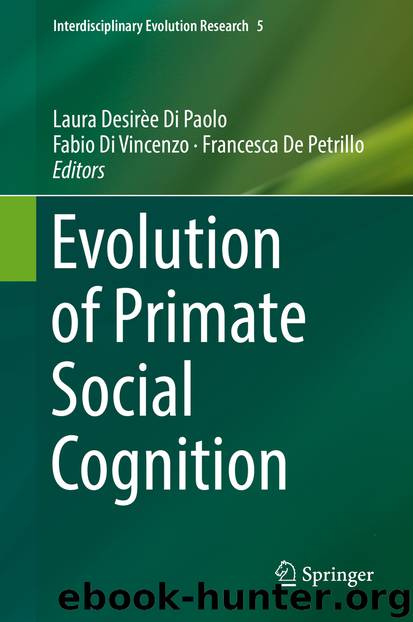Evolution of Primate Social Cognition by Laura Desirèe Di Paolo & Fabio Di Vincenzo & Francesca De Petrillo

Author:Laura Desirèe Di Paolo & Fabio Di Vincenzo & Francesca De Petrillo
Language: eng
Format: epub
ISBN: 9783319937762
Publisher: Springer International Publishing
4 Epigenetics and Differences Between Species
The term ‘species’ has a complex and controversial history beyond the scope of this paper. For our purposes, we assume that species as mentioned below exhibit phenotypes resulting at least in part from species-specific genotypes. It is increasingly clear, however, that just as the number of genes carried by individual genomes is less than expected, the genetic differences between species, in terms of DNA coding, are also narrower than might be expected (Chimpanzee Sequencing Analysis Consortium 2005).
In the case of individual variation, epigenetic regulation of gene expression is emerging as a key factor in explaining how so few genes (some with few, if any common alleles) can produce such a range of phenotypic variation. There are two processes by which this could be extended to differences between species. Firstly, and most controversially, it now appears that epigenetic modifications themselves can be inherited in some instances (Jablonka and Raz 2009; Nagy and Turecki 2015; Prokopuk et al. 2015). The potential stability of epigenetic modifications over multiple generations is currently uncertain in mammals although it has been observed in plants and is theoretically possible (citations). Although it would remain at least potentially reversible, it could result in permanent genetic adaptation by influencing the evolutionary process itself as discussed in a later section below.
Secondly (and possibly facilitated by the process described above), there may be changes to the regulatory elements that direct the processes of epigenetic modification. To give a theoretical example as illustration, a gene may be regulated by methylation at a non-coding CpG site. If there is an otherwise neutral mutation at that site, from CpG to TpG (a relatively common mutation), the regulation of that gene will be altered because it has lost a methylation site. If methylation was downregulating that gene, that is, supressing expression, this gene will henceforth be upregulated—more of the gene product, that specific protein, will be made. Whether this produces individual variation within a species or leads to divergence between species will depend on what that protein does and how it influences reproductive fitness in the current environment.
Download
This site does not store any files on its server. We only index and link to content provided by other sites. Please contact the content providers to delete copyright contents if any and email us, we'll remove relevant links or contents immediately.
| Biomathematics | Differential Equations |
| Game Theory | Graph Theory |
| Linear Programming | Probability & Statistics |
| Statistics | Stochastic Modeling |
| Vector Analysis |
Modelling of Convective Heat and Mass Transfer in Rotating Flows by Igor V. Shevchuk(6440)
Weapons of Math Destruction by Cathy O'Neil(6280)
Factfulness: Ten Reasons We're Wrong About the World – and Why Things Are Better Than You Think by Hans Rosling(4742)
A Mind For Numbers: How to Excel at Math and Science (Even If You Flunked Algebra) by Barbara Oakley(3307)
Descartes' Error by Antonio Damasio(3279)
Factfulness_Ten Reasons We're Wrong About the World_and Why Things Are Better Than You Think by Hans Rosling(3237)
TCP IP by Todd Lammle(3185)
Fooled by Randomness: The Hidden Role of Chance in Life and in the Markets by Nassim Nicholas Taleb(3124)
The Tyranny of Metrics by Jerry Z. Muller(3073)
Applied Predictive Modeling by Max Kuhn & Kjell Johnson(3071)
The Book of Numbers by Peter Bentley(2968)
The Great Unknown by Marcus du Sautoy(2695)
Once Upon an Algorithm by Martin Erwig(2649)
Easy Algebra Step-by-Step by Sandra Luna McCune(2635)
Lady Luck by Kristen Ashley(2582)
Police Exams Prep 2018-2019 by Kaplan Test Prep(2549)
Practical Guide To Principal Component Methods in R (Multivariate Analysis Book 2) by Alboukadel Kassambara(2544)
All Things Reconsidered by Bill Thompson III(2393)
Linear Time-Invariant Systems, Behaviors and Modules by Ulrich Oberst & Martin Scheicher & Ingrid Scheicher(2371)
